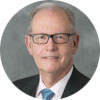Download PDF

The goal of the Minority Ophthalmology Mentoring program is to provide support to medical students from groups underrepresented in ophthalmology (relative to the patient population) so that they will strongly consider choosing ophthalmology as a career path. They come from a broad spectrum of backgrounds and medical schools. Most are rising second-year medical students.
The program was born not in response to the events of last year, but in 2016 after data emerged revealing that although certain minority groups make up over 30% of the U.S. population, they constituted only 6% of practicing ophthalmologists. Further, the percentage of ophthalmologists who are Black had not increased in decades.
Why is this so important? Studies have shown that, in general, patients prefer to go to physicians of the same color or ethnicity. They see physicians more often and have better outcomes of care. And physicians of color practice in communities of color more often than other physicians. This is important to the health of our communities.
This is not just an issue in ophthalmology, but throughout medicine. The racial and ethnic groups underrepresented in medicine (URIM) constitute only about 8% of the physician population. There are a host of factors contributing to this disparity, and at the top of the list is a paucity of compelling role models and mentors. Think about why you chose ophthalmology. The odds are that either in your personal life or in your medical school career you had an ophthalmologist role model. You said, “I want to be like that person.”
What happens if you can’t envision that? One Black physician colleague said, “You have to be able to see your own dreams.” And it’s not just a single version of the dream—each person has their own narrative. There is not one standard image of a Black male ophthalmologist any more than there is of any subgroup of physicians—women/men; Black/Brown/ White; rural/urban; privileged/poor upbringing.
There is also what has been called “the soft bigotry of low expectations.” It is a special challenge to excel when those around you—be it friends, teachers, colleagues, and even patients—don’t anticipate excellence.
The Minority Ophthalmology Mentoring Program exists to provide mentorship and preparatory resources to enable ophthalmology resident applicants to succeed. The Academy serves as a steward both for our profession and for eye care in our communities. Helping to develop and support an ophthalmology workforce that meets the needs of our diverse American community is part of our collective mission.
The yearlong mentoring program has increased from 25 students in its first year to about 100 this year. It includes sessions in preparing for standardized exams; career choice; networking with faculty, residents, and community ophthalmologists; skills transfer; a visit to the annual meeting; and ongoing mentorship.
Does it work? One student wrote, “It was empowering to see such diverse physicians make it to their dream field. I am inspired …” Program graduates have already been accepted at over 15 residency programs. More than 240 Academy member ophthalmologists have been mentors or program participants!
This is not solely an Academy program. The Association of University Professors of Ophthalmology is a multiyear (and critically important) partner. The Alcon Foundation, Genentech, Mallinckrodt Pharmaceuticals, and Dompé are major corporate supporters. The Academy Leadership Development Program XXI Class of 2019 came together with a major gift. The American Board of Ophthalmology, Women in Ophthalmology, and most ophthalmology subspecialty societies stepped up as well.
Finally, this would not be possible without the leadership over these years of some of our volunteer colleagues who have a shared passion. It is a very long list, but I must in particular mention Drs. Keith Carter, Michelle Latting, Cesar Briceno, Mildred Olivier, and Susan Forster.
For more information about the program, its sponsors, and its incredible volunteers, please go to aao.org/minority-mentoring.